#elasticsearch consulting
Explore tagged Tumblr posts
Text
Hire Expert Elasticsearch Developers to Accelerate Search Performance & Business Insights
Looking to enhance your application’s search capabilities and scale with confidence? Hire expert Elasticsearch developers from Prosperasoft to power smarter, faster, and more secure search solutions across your digital platforms.
Our seasoned Elasticsearch team brings deep technical expertise across E-commerce, Fintech, Healthcare, SaaS, and more. From seamless cloud migrations to performance optimization, we ensure your search engine is fast, scalable, and secure.
Why Prosperasoft? ✅ 100+ customized Elasticsearch solutions delivered ✅ Trusted by 50+ global startups & enterprises ✅ Lightning-fast onboarding & flexible contracts ✅ 24/7 production support and emergency response ✅ Enterprise-grade consulting with strict NDA protection
We go beyond basic implementation. Our experts help you unlock real-time business insights and enhance search relevance with advanced ELK stack integration, cloud migration, and version upgrades.
Get started today and transform your user search experience with confidence. 🔎 Hire expert Elasticsearch developers now
#Hire Expert Elasticsearch Developers#Expert Elasticsearch Developers#Elasticsearch Developers#elasticsearch consulting#hire elasticsearch developer#elasticsearch developer for hire
0 notes
Text
NextBrick's Elasticsearch Consulting: Elevate Your Search and Data Capabilities
In today's data-driven world, Elasticsearch is a critical tool for businesses of all sizes. This powerful open-source search and analytics engine can help you explore, analyze, and visualize your data in ways that were never before possible. However, with its vast capabilities and complex architecture, Elasticsearch can be daunting to implement and manage.
That's where NextBrick's Elasticsearch consulting services come in. Our team of experienced consultants has a deep understanding of Elasticsearch and its capabilities. We can help you with everything from designing and implementing efficient data models to optimizing search queries and troubleshooting performance bottlenecks.
Why Choose NextBrick for Elasticsearch Consulting?
Tailored solutions: We understand that every business is unique. That's why we take the time to understand your specific needs and goals before developing a tailored Elasticsearch solution.
Performance optimization: Our consultants are experts in Elasticsearch performance tuning. We can help you ensure that your Elasticsearch cluster is running smoothly and efficiently, even as your data volume and traffic grow.
Expert support: We offer a wide range of Elasticsearch support services, including 24/7 monitoring, issue resolution, and ongoing performance optimization.
How NextBrick's Elasticsearch Consulting Can Help You
Here are just a few ways that NextBrick's Elasticsearch consulting services can help you:
Improve search relevance: Our consultants can help you design and implement efficient data models and search queries that deliver more relevant results to your users.
Optimize performance: We can help you identify and address performance bottlenecks, ensuring that your Elasticsearch cluster is running smoothly and efficiently.
Troubleshoot issues: Our consultants can help you troubleshoot any Elasticsearch issues that you may encounter, including indexing errors, query performance problems, and security vulnerabilities.
Migrate from other search solutions: If you're currently using a different search solution, we can help you migrate to Elasticsearch with minimal disruption to your business.
Develop custom Elasticsearch applications: Our consultants can help you develop custom Elasticsearch applications to meet your specific needs, such as product search, real-time analytics, and log management.
Elevate Your Search and Data Capabilities with NextBrick
If you're serious about using Elasticsearch to elevate your search and data capabilities, then NextBrick is the partner you need. Our team of experienced consultants can help you with every aspect of Elasticsearch implementation and management, from design to deployment to support.
Contact us today to learn more about our Elasticsearch consulting services and how we can help you achieve your business goals.
0 notes
Text
What is Solr – Comparing Apache Solr vs. Elasticsearch
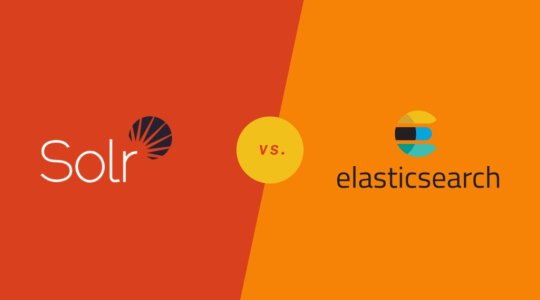
In the world of search engines and data retrieval systems, Apache Solr and Elasticsearch are two prominent contenders, each with its strengths and unique capabilities. These open-source, distributed search platforms play a crucial role in empowering organizations to harness the power of big data and deliver relevant search results efficiently. In this blog, we will delve into the fundamentals of Solr and Elasticsearch, highlighting their key features and comparing their functionalities. Whether you're a developer, data analyst, or IT professional, understanding the differences between Solr and Elasticsearch will help you make informed decisions to meet your specific search and data management needs.
Overview of Apache Solr
Apache Solr is a search platform built on top of the Apache Lucene library, known for its robust indexing and full-text search capabilities. It is written in Java and designed to handle large-scale search and data retrieval tasks. Solr follows a RESTful API approach, making it easy to integrate with different programming languages and frameworks. It offers a rich set of features, including faceted search, hit highlighting, spell checking, and geospatial search, making it a versatile solution for various use cases.
Overview of Elasticsearch
Elasticsearch, also based on Apache Lucene, is a distributed search engine that stands out for its real-time data indexing and analytics capabilities. It is known for its scalability and speed, making it an ideal choice for applications that require near-instantaneous search results. Elasticsearch provides a simple RESTful API, enabling developers to perform complex searches effortlessly. Moreover, it offers support for data visualization through its integration with Kibana, making it a popular choice for log analysis, application monitoring, and other data-driven use cases.
Comparing Solr and Elasticsearch
Data Handling and Indexing
Both Solr and Elasticsearch are proficient at handling large volumes of data and offer excellent indexing capabilities. Solr uses XML and JSON formats for data indexing, while Elasticsearch relies on JSON, which is generally considered more human-readable and easier to work with. Elasticsearch's dynamic mapping feature allows it to automatically infer data types during indexing, streamlining the process further.
Querying and Searching
Both platforms support complex search queries, but Elasticsearch is often regarded as more developer-friendly due to its clean and straightforward API. Elasticsearch's support for nested queries and aggregations simplifies the process of retrieving and analyzing data. On the other hand, Solr provides a range of query parsers, allowing developers to choose between traditional and advanced syntax options based on their preference and familiarity.
Scalability and Performance
Elasticsearch is designed with scalability in mind from the ground up, making it relatively easier to scale horizontally by adding more nodes to the cluster. It excels in real-time search and analytics scenarios, making it a top choice for applications with dynamic data streams. Solr, while also scalable, may require more effort for horizontal scaling compared to Elasticsearch.
Community and Ecosystem
Both Solr and Elasticsearch boast active and vibrant open-source communities. Solr has been around longer and, therefore, has a more extensive user base and established ecosystem. Elasticsearch, however, has gained significant momentum over the years, supported by the Elastic Stack, which includes Kibana for data visualization and Beats for data shipping.
Document-Based vs. Schema-Free
Solr follows a document-based approach, where data is organized into fields and requires a predefined schema. While this provides better control over data, it may become restrictive when dealing with dynamic or constantly evolving data structures. Elasticsearch, being schema-free, allows for more flexible data handling, making it more suitable for projects with varying data structures.
Conclusion
In summary, Apache Solr and Elasticsearch are both powerful search platforms, each excelling in specific scenarios. Solr's robustness and established ecosystem make it a reliable choice for traditional search applications, while Elasticsearch's real-time capabilities and seamless integration with the Elastic Stack are perfect for modern data-driven projects. Choosing between the two depends on your specific requirements, data complexity, and preferred development style. Regardless of your decision, both Solr and Elasticsearch can supercharge your search and analytics endeavors, bringing efficiency and relevance to your data retrieval processes.
Whether you opt for Solr, Elasticsearch, or a combination of both, the future of search and data exploration remains bright, with technology continually evolving to meet the needs of next-generation applications.
2 notes
·
View notes
Text
Pluto AI: A New Internal AI Platform For Enterprise Growth

Pluto AI
Magyar Telekom, Deutsche Telekom's Hungarian business, launched Pluto AI, a cutting-edge internal AI platform, to capitalise on AI's revolutionary potential. This project is a key step towards the company's objective of incorporating AI into all business operations and empowering all employees to use AI's huge potential.
After realising that AI competence is no longer a luxury but a necessary for future success, Magyar Telekom faced comparable issues, such as staff with varying AI comprehension and a lack of readily available tools for testing and practical implementation. To address this, the company created a scalable system that could serve many use cases and adapt to changing AI demands, democratising AI knowledge and promoting innovation.
Pluto AI was founded to provide business teams with a simple prompting tool for safe and lawful generative AI deployment. Generative AI and its applications were taught to business teams. This strategy led to the company's adoption of generative AI, allowing the platform to quickly serve more use cases without the core platform staff having to comprehend every new application.
Pluto AI development
Google Cloud Consulting and Magyar Telekom's AI Team built Pluto AI. This relationship was essential to the platform's compliance with telecom sector security and compliance regulations and best practices.
Pluto AI's modular design lets teams swiftly integrate, change, and update AI models, tools, and architectural patterns. Its architecture allows the platform to serve many use cases and grow swiftly with Magyar Telekom's AI goal. Pluto AI includes Retrieval Augmented Generation (RAG), which combines LLMs with internal knowledge sources, including multimodal content, to provide grounded responses with evidence, API access to allow other parts of the organisation to integrate AI into their solutions, Large Language Models (LLMs) for natural language understanding and generation, and code generation and assistance to increase developer productivity.
The platform also lets users develop AI companions for specific business needs.
Pluto AI employs virtual machines and Compute Engine for scalability and reliability. It uses foundation models from the Model Garden on Vertex AI, including Anthropic's Claude 3.5 Sonnet and Google's Gemini, Imagen, and Veo. RAG procedures use Google Cloud ElasticSearch for knowledge bases. Other Google Cloud services like Cloud Logging, Pub/Sub, Storage, Firestore, and Looker help create production-ready apps.
The user interface and experience were prioritised during development. Pluto AI's user-friendly interface lets employees of any technical ability level use AI without a steep learning curve.
With hundreds of daily active users from various departments, the platform has high adoption rates. Its versatility and usability have earned the platform high praise from employees. Pluto AI has enabled knowledge management, software development, legal and compliance, and customer service chatbots.
Pluto AI's impact is quantified. The platform records tens of thousands of API requests and hundreds of thousands of unique users daily. A 15% decrease in coding errors and a 20% reduction in legal paper review time are expected.
Pluto AI vision and roadmap
Pluto AI is part of Magyar Telekom's long-term AI plan. Plans call for adding departments, business divisions, and markets to the platform. The company is also considering offering Pluto AI to other Deutsche Telekom markets.
A multilingual language selection, an enhanced UI for managing RAG solutions and tracking usage, and agent-based AI technologies for automating complex tasks are envisaged. Monitoring and optimising cloud resource utilisation and costs is another priority.
Pluto AI has made AI usable, approachable, and impactful at Magyar Telekom. Pluto AI sets a new standard for internal AI adoption by enabling experimentation and delivering business advantages.
#PlutoAI#generativeAI#googlecloudPlutoAI#DevelpoingPlutoAI#MagyarTelekom#PlutoAIRoadmap#technology#technews#technologynews#news#govindhtech
0 notes
Text
Retrospective of 2024 - Long Time Archive
I would like to reflect on what I built last year through the lense of a software architect. This is the first installement in a series of architecture articles.
Last year, I had the opportunity to design and implement an archiving service to address GDPR requirements. In this article, I’ll share how we tackled this challenge, focusing on the architectural picture.
Introduction
This use case revolves around the Log Data Shipper, a core system component responsible for aggregating logs from multiple applications. These logs are stored in Elasticsearch, where they can be accessed and analyzed through an Angular web application. Users of the application (DPOs) can search the logs according to certain criteria, here is an example of such a search form:
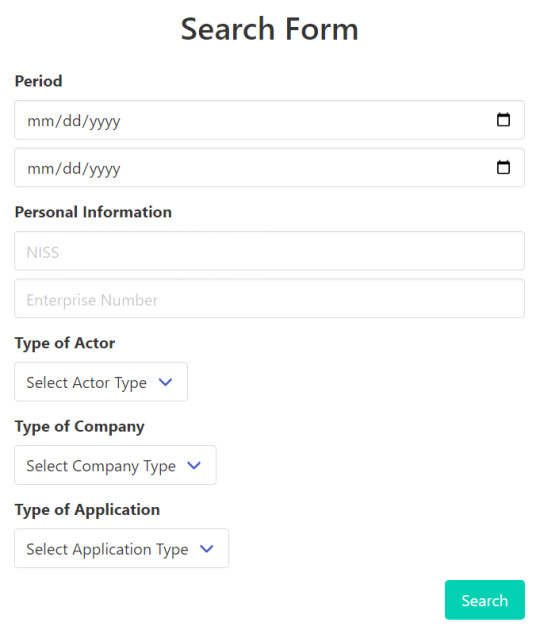
The system then retrieves logs from ES so that the user can sift through them or export them if necessary, basically do what DPOs do.
As the volume of data grows over time, storing it all in Elasticsearch becomes increasingly expensive. To manage these costs, we needed a solution to archive logs older than two years without compromising the ability to retrieve necessary information later. This is where our archiving service comes into play.
Archiving Solution
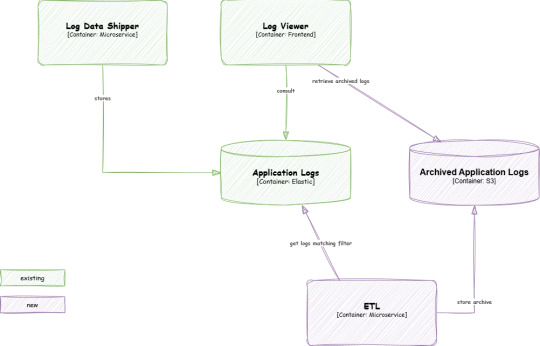
Our approach involved creating buckets of data for logs older than two years and storing them on an S3 instance. Since the cost of storing compressed data is very low and the retention is very high, this was a cost-effective choice. To make retrieval efficient, we incorporated bloom filters into the design.
Bloom Filters
A bloom filter is a space-efficient probabilistic data structure used to test whether an element is part of a set. While it can produce false positives, it’s guaranteed not to produce false negatives, which made it an ideal choice for our needs.

During the archiving process, the ETL processes batches of logs and extracts essential data. For each type of data, we calculate a corresponding bloom filter - each search criteria in the form -. Both the archives and their associated bloom filters (a metadata field) are stored in S3.
When a user needs to retrieve data, the system tests each bloom filter against the search criteria. If a match is found, the corresponding archive is downloaded from S3. Although bloom filters might indicate the presence of data that isn’t actually in the archive (a false positive), this trade-off was acceptable for our use case as we are re-loading the logs in an temporary ES index. Finally we sort out all unecessary logs and the web application can read the logs in the same way current logs are consulted. We call this process "hydration".
Conclusion
This project was particularly interesting because it tackled an important topic – GDPR compliance – while allowing us to think outside the box by applying lesser-known data structures like bloom filters. Opportunities to solve challenging problems like this don’t come often, making the experience all the more rewarding.
It was also a great learning opportunity as I challenged the existing architecture, which required an additional index database. With the help of my team, we proposed an alternative solution that was both elegant and cost-effective. This project reinforced the importance of collaborative problem-solving and showed how innovative thinking can lead to efficient solutions.
0 notes
Text
Custom AI Development Services - Grow Your Business Potential

AI Development Company
As a reputable Artificial Intelligence Development Company, Bizvertex provides creative AI Development Solutions for organizations using our experience in AI app development. Our expert AI developers provide customized solutions to meet the specific needs of various sectors, such as intelligent chatbots, predictive analytics, and machine learning algorithms. Our custom AI development services are intended to empower your organization and produce meaningful results as it embarks on its digital transformation path.
AI Development Services That We Offer
Our AI development services are known to unlock the potential of vast amounts of data for driving tangible business results. Being a well-established AI solution provider, we specialize in leveraging the power of AI to transform raw data into actionable insights, paving the way for operational efficiency and enhanced decision-making. Here are our reliably intelligent AI Services that we convert your vision into reality.
Generative AI
Smart AI Assistants and Chatbot
AI/ML Strategy Consulting
AI Chatbot Development
PoC and MVP Development
Recommendation Engines
AI Security
AI Design
AIOps
AI-as-a-Service
Automation Solutions
Predictive Modeling
Data Science Consulting
Unlock Strategic Growth for Your Business With Our AI Know-how
Machine Learning
We use machine learning methods to enable sophisticated data analysis and prediction capabilities. This enables us to create solutions such as recommendation engines and predictive maintenance tools.
Deep Learning
We use deep learning techniques to develop effective solutions for complex data analysis tasks like sentiment analysis and language translation.
Predictive Analytics
We use statistical algorithms and machine learning approaches to create solutions that predict future trends and behaviours, allowing organisations to make informed strategic decisions.
Natural Language Processing
Our NLP knowledge enables us to create sentiment analysis, language translation, and other systems that efficiently process and analyse human language data.
Data Science
Bizvertex's data science skills include data cleansing, analysis, and interpretation, resulting in significant insights that drive informed decision-making and corporate strategy.
Computer Vision
Our computer vision expertise enables the extraction, analysis, and comprehension of visual information from photos or videos, which powers a wide range of applications across industries.
Industries Where Our AI Development Services Excel
Healthcare
Banking and Finance
Restaurant
eCommerce
Supply Chain and Logistics
Insurance
Social Networking
Games and Sports
Travel
Aviation
Real Estate
Education
On-Demand
Entertainment
Government
Agriculture
Manufacturing
Automotive
AI Models We Have Expertise In
GPT-4o
Llama-3
PaLM-2
Claude
DALL.E 2
Whisper
Stable Diffusion
Phi-2
Google Gemini
Vicuna
Mistral
Bloom-560m
Custom Artificial Intelligence Solutions That We Offer
We specialise in designing innovative artificial intelligence (AI) solutions that are tailored to your specific business objectives. We provide the following solutions.
Personlization
Enhanced Security
Optimized Operations
Decision Support Systems
Product Development
Tech Stack That We Using For AI Development
Languages
Scala
Java
Golang
Python
C++
Mobility
Android
iOS
Cross Platform
Python
Windows
Frameworks
Node JS
Angular JS
Vue.JS
React JS
Cloud
AWS
Microsoft Azure
Google Cloud
Thing Worx
C++
SDK
Kotlin
Ionic
Xamarin
React Native
Hardware
Raspberry
Arduino
BeagleBone
OCR
Tesseract
TensorFlow
Copyfish
ABBYY Finereader
OCR.Space
Go
Data
Apache Hadoop
Apache Kafka
OpenTSDB
Elasticsearch
NLP
Wit.ai
Dialogflow
Amazon Lex
Luis
Watson Assistant
Why Choose Bizvertex for AI Development?
Bizvertex the leading AI Development Company that provides unique AI solutions to help businesses increase their performance and efficiency by automating business processes. We provide future-proof AI solutions and fine-tuned AI models that are tailored to your specific business objectives, allowing you to accelerate AI adoption while lowering ongoing tuning expenses.
As a leading AI solutions provider, our major objective is to fulfill our customers' business visions through cutting-edge AI services tailored to a variety of business specializations. Hire AI developers from Bizvertex, which provides turnkey AI solutions and better ideas for your business challenges.
#AI Development#AI Development Services#Custom AI Development Services#AI Development Company#AI Development Service Provider#AI Development Solutions
0 notes
Text
Unlock the Power of Open Source Technologies with HawkStack
In today’s fast-evolving technological landscape, Open Source solutions have become a driving force for innovation and scalability. At HawkStack, we specialize in empowering businesses by leveraging the full potential of Open Source technologies, offering cutting-edge solutions, consulting, training, and certification.
The Open Source Advantage
Open Source technologies provide flexibility, cost-efficiency, and community-driven development, making them essential tools for businesses looking to grow in a competitive environment. HawkStack's expertise spans across multiple domains, allowing you to adopt, implement, and scale your Open Source strategy seamlessly.
Our Expertise Across Key Open Source Technologies
Linux Distributions We support a wide range of Linux distributions, including Ubuntu and CentOS, offering reliable platforms for both server and desktop environments. Our team ensures smooth integration, security hardening, and optimal performance for your systems.
Containers & Orchestration With Docker and Kubernetes, HawkStack helps you adopt containerization and microservices architecture, enhancing application portability, scalability, and resilience. Kubernetes orchestrates your applications, providing automated deployment, scaling, and management.
Web Serving & Data Solutions Our deep expertise in web serving technologies like NGINX and scalable data solutions like Elasticsearch and MongoDB enables you to build robust, high-performing infrastructures. These platforms are key to creating fast, scalable web services and data-driven applications.
Automation with Ansible Automation is the backbone of efficient IT operations. HawkStack offers hands-on expertise with Ansible, a powerful tool for automating software provisioning, configuration management, and application deployment, reducing manual efforts and operational overhead.
Emerging Technologies We are at the forefront of emerging technologies like Apache Kafka, TensorFlow, and OpenStack. Whether you're building real-time streaming platforms with Kafka, deploying machine learning models with TensorFlow, or exploring cloud infrastructure with OpenStack, HawkStack has the know-how to guide your journey.
Why Choose HawkStack?
At HawkStack, our mission is to empower businesses with Open Source solutions that are secure, scalable, and future-proof. From consulting and implementation to training and certification, we ensure your teams are well-equipped to navigate and maximize the potential of these innovations.
Ready to harness the power of Open Source? Explore our full range of services and solutions by visiting HawkStack.
Empower your business today with HawkStack — your trusted partner in Open Source technologies!
0 notes
Text
Explore Elasticsearch and Why It’s Worth Using?
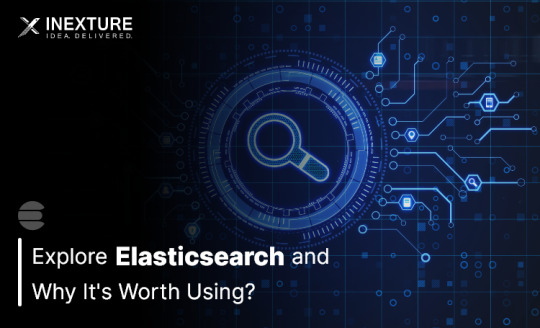
Elasticsearch is a powerful open-source search that allows you to store, Search, and analyse an immense volume of data quickly and it is built on top of Apache Lucene. It handles a large volume of data and provides as quick as flash search capabilities with near real-time results. It’s a database that can store, index, and access both structured and unstructured data.
It can store and index documents without the requirement for mentioned schemas since it takes a schema-less approach to document storage and indexing. This adaptability makes it appropriate for procedures involving regularly changing data structures or dealing with big, dynamic information.
Key Features Of Elasticsearch
Revert to a snapshot: It allows you to recover your data and gather the state from an earlier snapshot. It can be used to recover a system failure, migrate data to a different cluster, or roll back to a previous state.
Integration with Other Technologies: It integrates smoothly with various popular technologies and frameworks. It offers official clients and connectors for programming languages like Java, Python, .NET, and more. It also integrates well with data processing frameworks like Apache Spark and Hadoop, allowing stable interaction and data exchange between systems.
Aggregation Framework: It provides an in-depth aggregation framework that allows you to define a multitude of aggregations on your data. Aggregations work on groups of documents and can be nested to create complex analytical pipelines.
How Elasticsearch Fits Into The Search Engine Landscape
Elasticsearch is a professional and adaptable search and analytics engine that plays an essential role in the search engine surroundings.
Do you know why it is designed? It is designed to handle a wide range of use cases, including full-text search, structured search, geospatial search, and analytics. It also provides a flexible JSON-based query language which allows developers to create complex queries, apply filters and perform aggregations to extract meaningful insights from the indexed data.
Key Concepts And Terminology
Indices: Containers or logical namespaces that hold indexed data.
Documents: Basic units of information, represented as JSON objects.
Nodes: Instances of Elasticsearch that form a cluster.
Shards: Smaller units of an index that store and distribute data across nodes.
Replicas: Copies of index shards for redundancy and high availability.
Mapping: Defines the structure and characteristics of fields within an index.
Query: Request to retrieve specific data from indexed documents.
Query DSL: Elasticsearch’s domain-specific language for constructing queries.
Elastic Search’s Compatibility With Other Tools And Frameworks
Elasticsearch works well with a wide range of tools, frameworks, databases, and data sources, making it a versatile component of the data ecosystem. It works well with standard databases and data sources, allowing for fast data ingestion and retrieval. Connectors and plugins allow for database interaction with MySQL, PostgreSQL, MongoDB, and Apache Cassandra. Elasticsearch can now index and search data straight from these databases, giving new search capabilities on top of current data.
Elasticsearch monitoring and management are necessary for ensuring maximum performance and availability. Elasticsearch includes monitoring APIs and connects with tools such as Elasticsearch Watcher, Elastic APM, and Grafana. These tools provide for continuous monitoring of cluster health, resource utilisation, and query performance. Elasticsearch’s APIs and user interfaces also offer many administrative activities such as index management, cluster management, and security setup.
Elasticsearch, whether as a standalone search engine or as part of the ELK stack, delivers powerful search, analytics, and monitoring capabilities to unlock insights from varied data sources.
Tools And Techniques For Monitoring Cluster Health And Performance:
Elasticsearch has built-in monitoring APIs.
Monitoring technologies such as Elasticsearch Watcher, Elastic APM, and Grafana is integrated.
Insights into cluster performance, resource utilisation, and query latency in real-time.
Common Management Tasks:
Scaling the cluster can increase performance by adding or removing nodes.
Using snapshot and restore features to implement backup and disaster recovery methods.
Upgrading Elasticsearch while guaranteeing compatibility with plugins and apps by following official upgrade guides.
Troubleshooting Common Issues And Error Handling:
Reviewing logs and error messages for diagnostics.
Analyzing cluster health and configuration.
Seeking support from the active Elasticsearch community and official channels.
Use Cases And Success Stories:
Popular applications include log analytics, e-commerce search, geospatial analysis, and real-time monitoring.
Companies like Netflix, GitHub, and Verizon have successfully utilized Elasticsearch Consulting for fast data retrieval, personalized recommendations, and efficient log analysis.
Industries And Domains Benefiting From Elasticsearch
Elasticsearch is an adaptable search and analytics engine that has applications in a wide range of businesses and topics. Elasticsearch is useful in the following industries and domains:
IoT and Log Analytics: Managing and extracting insights from massive volumes of machine-generated data.
Log Data Centralization
Real-time Data Ingestion and Analysis
Powerful Search and Query Capabilities
Anomaly Detection and Monitoring
Predictive Maintenance and Optimization
Government and Public Sector: Enhance data management, decision-making, and service delivery.
Open Data Portals
Citizen Services
Fraud Detection and Prevention
Compliance Monitoring
Crisis Management and Emergency Response
In short, elastic search is a powerful and feature-rich search and analytics engine that provides outstanding value to developers, data engineers, and companies. Elasticsearch is definitely worth thinking about if you’re creating a search engine, monitoring logs, or analysing data for business insights.
Originally published by: Explore Elasticsearch and Why It’s Worth Using?
#Elasticsearch Consulting#Elasticsearch Consulting services#Elasticsearch Framework#Hire Elasticsearch Consultant
0 notes
Link
As a Consultants at Spoon Consulting, and certified partner of Elastic, our goal is to provide the best services around the Elastic Technologies. In the blog of the Spoon’s Elastic Team, we provide our best practices, detailed use cases, and product focus to help everyone in their Elastic search projects
2 notes
·
View notes
Text
Solr vs. Elasticsearch: Making the Right Choice with Expert Consulting
Solr and Elasticsearch are two of the most popular open-source search engines. Both search engines are known for their performance, scalability, and flexibility. However, there are some key differences between the two search engines.
Solr
Solr is a distributed search engine that is built on top of Apache Lucene. Solr is known for its performance and scalability. Solr is a good choice for applications that need to handle large volumes of data or that need to be available 24/7.
Elasticsearch
Elasticsearch is a distributed search and analytics engine that is built on Apache Lucene. Elasticsearch is known for its scalability and ease of use. Elasticsearch is a good choice for applications that need to handle large volumes of data or that need to be able to perform complex analytics.
Which search engine is right for you?
The best search engine for you will depend on your specific needs and requirements. If you need a search engine that is known for its performance and scalability, then Solr is a good choice. If you need a search engine that is easy to use and that can perform complex analytics, then Elasticsearch is a good choice.
Expert consulting can help you to make the right choice
If you are not sure which search engine is right for you, then it is a good idea to consult with an expert. An expert can help you to assess your needs and requirements and to choose the right search engine for your application.
Here are some additional tips for choosing the right search engine:
Consider your needs and requirements. What do you need your search engine to do? How much data do you need to index? How many users do you expect to use your search engine? Evaluate the features of each search engine. Solr and Elasticsearch offer a variety of features, such as faceted search, geospatial search, and machine learning. Make sure to choose a search engine that has the features that you need. Consider your budget. Solr and Elasticsearch are both open-source search engines, but there are also commercial versions of both search engines available. Commercial versions of Solr and Elasticsearch offer additional features and support. Talk to experts. If you are not sure which search engine is right for you, talk to experts. Experts can help you to assess your needs and requirements and to choose the right search engine for your application.
Solr and Elasticsearch are both powerful search engines. The best search engine for you will depend on your specific needs and requirements. If you are not sure which search engine is right for you, then it is a good idea to consult with an expert. An expert can help you to make the right choice and to get the most out of your search engine.
0 notes
Link
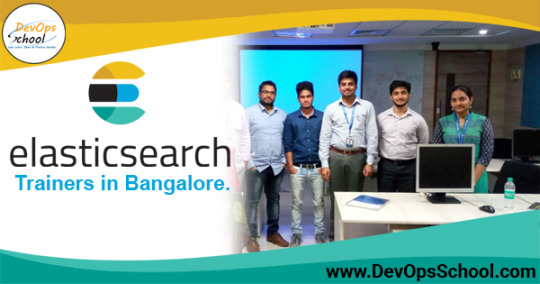
0 notes
Text
Top 4 Enterprise Search Software in 2021
Nowadays, we cannot imagine our life without Google. We use it daily to find solutions for a wide range of challenges from home issues to business problems.
The Internet Live Stats Tracker states that over 40,000 users Google data every second that transforms into enormous 1.2 trillion search requests a year. It looks spectacular, right?

This statistics allows us to realize that millions of people are ready to consume gigabytes of data and the power of search engines only tends to grow. What’s more, data search becomes an integral attribute and tool for any business to find, analyze information, and improve scalability.
As Peter Morville, a consultant, influencer, and co-author of the best-selling book ‘Information Architecture for the World Wide Web’, once said:
What we find changes who we become.
The core reason for businesses to use data search is the generation of valuable insights that let companies step forward and adapt to constantly changing users’ demands.
Here comes enterprise search software that helps entrepreneurs efficiently seek for and analyze data in a matter of seconds. However, what is the best way to find the right and relevant technology solution for your specific business needs?
Today we want to guide you through the top 4 enterprise search software solutions covering their pros and cons to help you make the right decision for your business. Besides, we provide a comparison matrix of these tools to bring a high-level overview of them for your guidance.
Elasticsearch

Established: 8 February 2010
Elasticsearch pricing:
Standard - $16/month
Gold - $19/month
Platinum - $22/month
Enterprise – individual
What is Elasticsearch? So, it is one of the most popular open-source enterprise search software in the Big Data industry with embedded JSON REST API and built on Apache Lucene and Java.
Elasticsearch was released to establish multitenant-capable full-text search and analysis of large amount of data. The tool’s opportunities make Elasticsearch a perfect choice for both middle and enterprise-scale projects that need more resources.
What companies use Elasticsearch?

What are the key features of Elasticsearch?
Scalability and fault tolerance
Multitenancy
Operational stability
Schema-free

Why do we use Elasticsearch at Ascendix?
The key reason Ascendix development teams choose Elasticsearch is the high performance it provides. So, we can avoid 1-3 seconds for a search result to be generated and provide our clients with immediate data without solid delays.
You may ask the following question: “Why is Elasticsearch so fast?”
The answer lies in the essence of shards which are the set of inverted indices. Simply speaking, this enterprise search software generates multiple inverted indices tables each time after indexing which saves much time for both the program and end-users that get immediate results.
Algolia

Established: 2012
Algolia pricing:
Free – up to 10 units (1000 requests)
Standard - $1/unit/month
Gold - $1.5/unit/month
OEM - individual
Companies that use Algolia

Why use Algolia?
Site search
Voice search
Geo search
Mobile search

What are the key features of Algolia Search?
Search rules
InstantSearch
Personalization
A/B testing
Specific search API
Algolia AI

You can learn more details about each enterprise search software feature on their official website.
Azure Cognitive Search

Established: 2008
Azure Search service pricing:
Free – only 50 mb storage
Basic - $73.73/month
Standard S1- $245.28/month
Standard S2 - $981.12/month
Standard S3 – 1,962.24/month
Storage Optimized L1 - $2,802.47/month
Storage Optimized L2 – individual
What is Azure Cognitive Search?
It is a cloud search service by Microsoft with integrated AI features that allow to quickly identify and analyze relevant data of any scale. This way, Azure cognitive search allows you to build mobile and web applications with powerful enterprise search features.
Companies that use Azure Search

Key features of Azure full-text search
Powerful indexing
Data processing
Query & Relevancy Ranking

Swiftype

Established: January 2012
Swiftype pricing:
Swiftype App Search - $49/mo
Swiftype Site Search - $79/mo
Swiftype search is a cloud-based and customizable software-as-a-service platform that allows your business to create a powerful search experience and work with data efficiently. Established in 2012, the company has acquired $23 million and has been improving the product continuously.
What companies use Swiftype?

Core features of Swiftype
Powerful Search Algorithm
Content ingestion and syncing
Deep analytics
Real-time indexing

Enterprise Search Software Comparison Matrix
Each search tool mentioned above has its benefits and drawbacks in terms of specific aspects. In order to help you choose the best enterprise search software, let’s look at the comparison of Elasticsearch vs Algolia vs Azure vs Swiftype below.
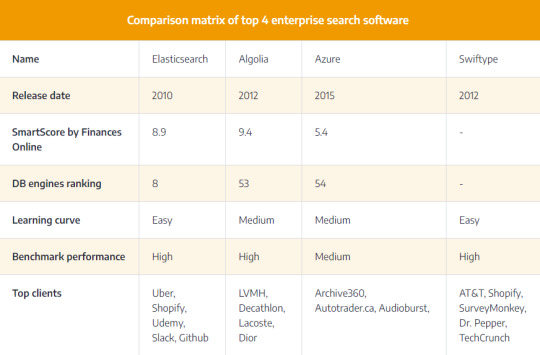
Final words
So, we have discussed the most trending and powerful search solutions. It's worth noting that there is no omni-purpose software that fits any business needs.
For this reason, take a look at these tools, compare them, and make the right choice that will perfectly suit your company's demands.
For more information, read the full article 4 Leading Enterprise Search Software to Look For in 2021.
2 notes
·
View notes
Link
Why DO You Need Elasticsearch Consulting & Implementation Services
Elasticsearch is a distributed, open-source search engine based on the Lucene library. It is designed to provide fast and scalable full-text search, as well as complex analytics and visualization capabilities.
0 notes
Text
In this guide, we will take you through the steps to Install Graylog on CentOS 8 / RHEL 8 with Elasticsearch 7.x and MongoDB 4.x. Graylog is an open-source log management system that allows System Administrators/Developers to aggregate up to terabytes of log data, from multiple log sources. It is highly scalable to fit any Infrastructure. Graylog comes with an intuitive UI, fast and powerful search feature, alerting and reporting. It lets you group systems into streams for ease of log searching and proper management. Graylog UI is simple and intuitive with complete user management and support for LDAP. Similar articles: How To Forward Logs to Grafana Loki using Promtail Install Graylog 4.x on CentOS 8 / RHEL 8 Linux Graylog requires Java, Elasticsearch, and MongoDB. Elasticsearch is responsible for logs storage. We will begin with the installation of the dependencies then Graylog. Note: This is a single server installation of Graylog on CentOS 8 / RHEL 8. For multi-cluster setup, consult official Graylog documentation. Step 1: Configure SELinux If you’re using SELinux on your system, set the following settings: sudo yum -y install curl vim policycoreutils python3-policycoreutils sudo setsebool -P httpd_can_network_connect 1 sudo semanage port -a -t http_port_t -p tcp 9000 sudo semanage port -a -t http_port_t -p tcp 9200 sudo semanage port -a -t mongod_port_t -p tcp 27017 Step 2: Install Java on RHEL / CentOS 8 As Elasticsearch depends on Java 8, you need it installed on your system prior to installing Elasticsearch RHEL 8 / CentOS 8. sudo yum install java-11-openjdk java-11-openjdk-devel Confirm Java installation: $ java -version openjdk version "11.0.14.1" 2022-02-08 LTS OpenJDK Runtime Environment 18.9 (build 11.0.14.1+1-LTS) OpenJDK 64-Bit Server VM 18.9 (build 11.0.14.1+1-LTS, mixed mode, sharing) Step 3: Install Elasticsearch 7 on RHEL 8 / CentOS 8 Add Elasticsearch repository: cat
0 notes
Text
How To Implement Elasticsearch With Spring Boot In Java Development ?
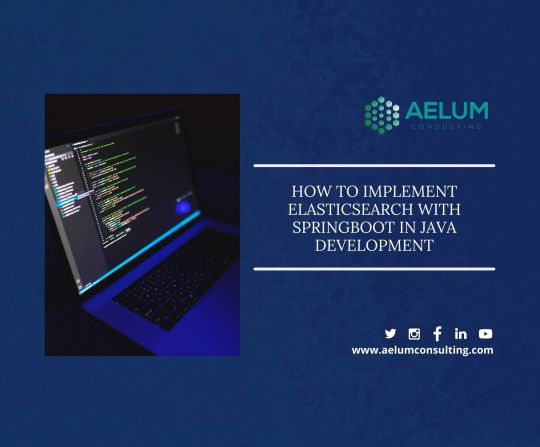
Java and Elastic Search are some of the topmost technologies used by many Companies.
Java is a high-level, object-oriented programming language launched in 1996. Java is acquired by the oracle and it is still in the active development phase. Elastic Search is the new Technology as compared to java and it was released by Elastic Search N.V. (Now elastic) in 2010. It is used by many companies as a search engine.
What is Elastic Search?
It is the open-source analytics and search engine for all types of data like textual, structured, unstructured, Numerical, and Geospatial data. The operations of elastic search are available in the form of Rest APIs.
Primary Functions In Elastic Search
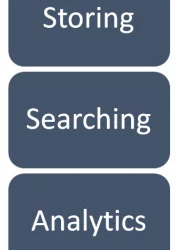
It helps in storing documents in an index.
It allows searching the index using some powerful queries to access the documents
Using analytics functions on the data
ELK STACK- ELK stack stands for elastic search, Logstash, and all these are provided by the elastic itself. Elastic Search is a NoSQL database created out of Apache Lucene. It is the central repository where all the data will be stored.

Why Elastic Search is used?
Elastic search is a search engine that stores the data in the form of JSON format and JSON messages. You can search for the data using HTTP calls.
Initiating an Elastic Search instance
Elasticsearch Implementation with Springboot
Creating Repository and document Model for Elastic Search
For More Details And Blogs : Aelum Consulting Blogs
If you want to increase the quality and efficiency of your ServiceNow workflows, Try out our ServiceNow Microassesment.
For ServiceNow Implementations and ServiceNow Consulting Visit our website: https://aelumconsulting.com/servicenow/
0 notes